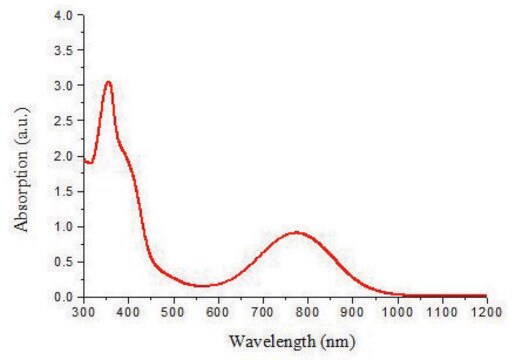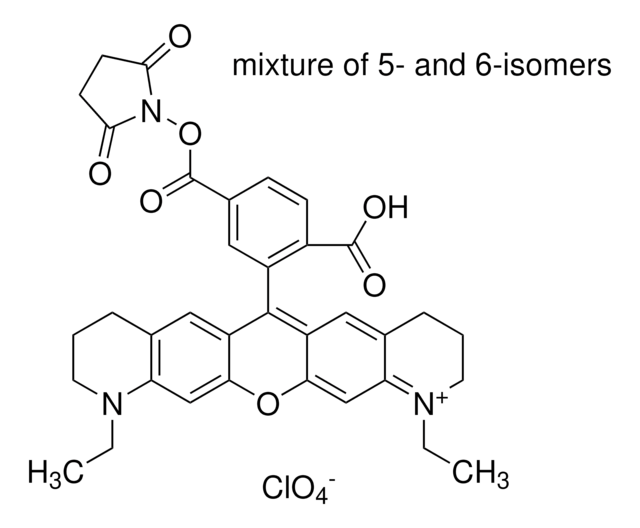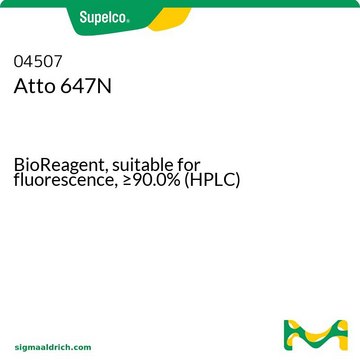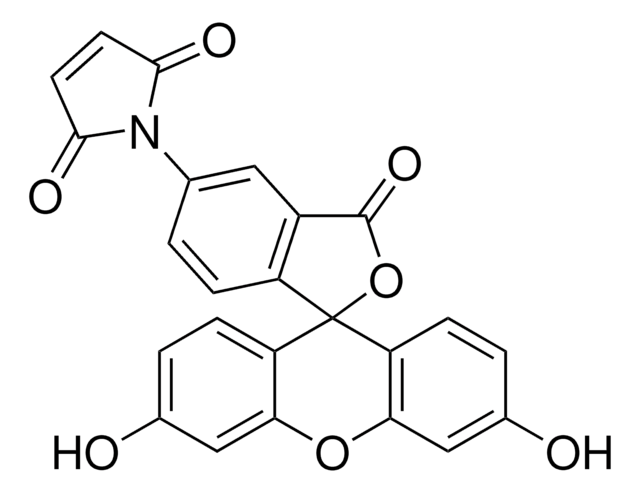49728
Atto 620 maleimide
suitable for fluorescence
Se connecterpour consulter vos tarifs contractuels et ceux de votre entreprise/organisme
About This Item
Code UNSPSC :
12352111
Nomenclature NACRES :
NA.32
Produits recommandés
Essai
≥80% (coupling to thiols)
Niveau de qualité
Forme
solid
Fabricant/nom de marque
ATTO-TEC GmbH
Fluorescence
λex 619 nm; λem 643 nm in 0.1 M phosphate pH 7.0
Adéquation
suitable for fluorescence
Température de stockage
−20°C
Description générale
Atto 620 belongs to a new generation of fluorescent labels for the red spectral region. The dye is designed for application in the area of life science, e.g. labelling of DNA, RNA or proteins. Characteristic features of the label are strong absorption, temperature dependent fluorescence, high thermal and photo-stability, good water
solubility, and very little triplet formation. Atto 620 is a cationic dye. After coupling to a substrate the dye carries a net electrical charge of +1. In common with most Atto-labels, absorption and fluorescence are independent of pH, at least in the range of pH 2 to 11, used in typical applications.
find more information here
solubility, and very little triplet formation. Atto 620 is a cationic dye. After coupling to a substrate the dye carries a net electrical charge of +1. In common with most Atto-labels, absorption and fluorescence are independent of pH, at least in the range of pH 2 to 11, used in typical applications.
find more information here
Conditionnement
Bottomless glass bottle. Contents are inside inserted fused cone.
Informations légales
This product is for Research use only. In case of intended commercialization, please contact the IP-holder (ATTO-TEC GmbH, Germany) for licensing.
Code de la classe de stockage
11 - Combustible Solids
Classe de danger pour l'eau (WGK)
WGK 3
Point d'éclair (°F)
Not applicable
Point d'éclair (°C)
Not applicable
Faites votre choix parmi les versions les plus récentes :
Certificats d'analyse (COA)
Lot/Batch Number
Vous ne trouvez pas la bonne version ?
Si vous avez besoin d'une version particulière, vous pouvez rechercher un certificat spécifique par le numéro de lot.
Déjà en possession de ce produit ?
Retrouvez la documentation relative aux produits que vous avez récemment achetés dans la Bibliothèque de documents.
Maria Strianese et al.
Journal of inorganic biochemistry, 104(6), 619-624 (2010-03-23)
In this paper we explore the use of fluorescently labeled cytochrome c peroxidase (CcP) from baker's yeast for monitoring nitric oxide (NO) down to the sub-micromolar level, by means of a FRET (Förster Resonance Energy Transfer) mechanism. The binding affinity
Maria Strianese et al.
Inorganic chemistry, 51(21), 11220-11222 (2012-10-18)
Fluorescently labeled cobalt peptide deformylase (Co-PDF) can be efficiently used as a fluorescence-resonance-energy-transfer-based sensing device for hydrogen sulfide (H(2)S). The proof of concept of our sensor system is substantiated by spectroscopic, structural, and theoretical results. Monohydrogen sulfide coordination to Co-PDF
Peter P T Surawski et al.
Molecular bioSystems, 4(7), 774-778 (2008-06-20)
The concept of optically encoding particles for solid phase organic synthesis has existed in the literature for several years. However, there remains a significant challenge to producing particles that are capable of withstanding harsh solvents and reagents whilst maintaining the
Darby Kozak et al.
Langmuir : the ACS journal of surfaces and colloids, 24(4), 1204-1211 (2007-12-11)
This study presents the use of flow cytometry as a high-throughput quantifiable technique to study multicomponent adsorption interactions between proteins and surfaces. Flow cytometry offers the advantage of high-throughput analysis of multiple parameters on a very small sampling scale. This
Notre équipe de scientifiques dispose d'une expérience dans tous les secteurs de la recherche, notamment en sciences de la vie, science des matériaux, synthèse chimique, chromatographie, analyse et dans de nombreux autres domaines..
Contacter notre Service technique



